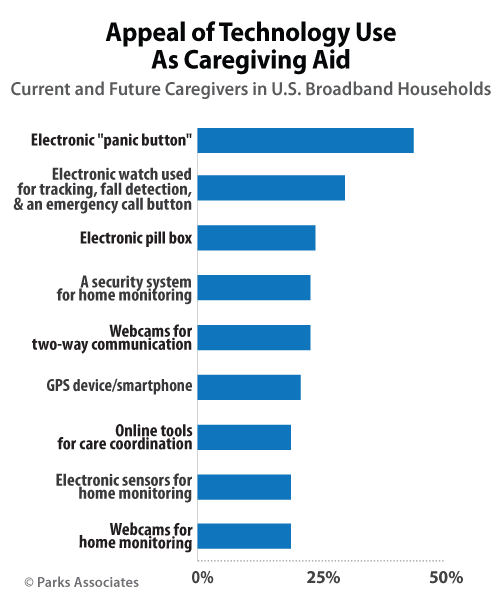
41 percent of caregivers in U.S. broadband households currently use a digital health device as part of their caregiving routine, including 8 percent who use online tools to coordinate their efforts, according to recent research from Parks Associates.
The research firm’s latest report, 360 View: Health Devices and Services for Connected Consumers 2014 analyzes multiple consumer surveys, including a 2Q 2014 survey of 10,000 U.S. broadband households, to analyze consumer health and wellness behaviors, calculate market potential for digital health solutions, and evaluate business strategies for consumer engagement and usage of wellness and fitness apps.
“Among U.S. broadband households, 22% have a head of household who currently provides care for a family member or anticipates doing so in the near future. At 2015 International CES, we’ll see many new digital health devices and software on display, including innovations from companies such as Sleep Number, Independa, Bosch Healthcare, and Grandcare, and wearable tech from iHealth Labs, Misfit, Sensogram, and Vancive Medical Technology.These innovative solutions will find strong interest among current caregivers, but they will also have high standards to meet in improving the ways caregivers can monitor their family members,”said Harry Wang, Director, Health & Mobile Product Research, Parks Associates in a statement.
For caregivers, 44 percent expressed having electronic panic button known as personal emergency response systems (PERS) that can signal can emergency if a family member falls or is unable to get help as their top concern. Also, 30% find an electronic tracking watch with a panic button appealing. Currently only 8% of caregivers use an electronic watch to track the family member under their care.
“The appeal of digital services to help provide care is far greater than current adoption levels of digital health solutions in general,” Wang said. “As we heard at our Connected Health Summit in September, demand for solutions that enable independent living at home is driving growth in the connected health markets. Solutions at CES, and the Digital Health Summit and Silvers Summit, will explore ways for connected technologies to provide better monitoring of family members.”
Parks Associates will also host CONNECTIONS™ Summit at CES on January 6, 2015.
